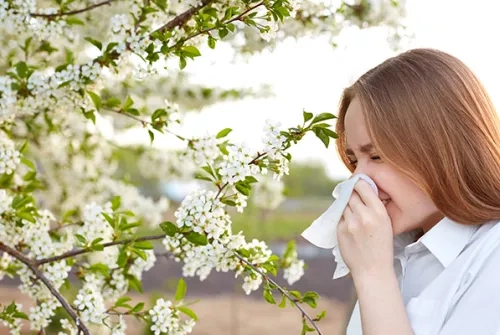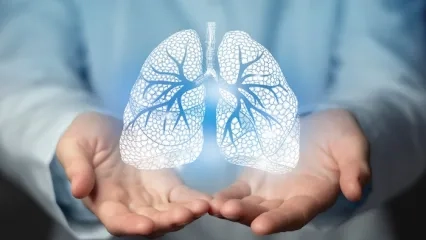Alo Yeditepe
Alo Yeditepe
Pollen Allergy Has No Season
Currently, with the spread of pollen in the air, complaints such as nasal congestion, sneezing, watery eyes, itching, and cough are very common... Salepçi stated that 'Patients wait eagerly for summer, but allergy problems do not end in summer'...
Pollen season is known as spring. However, Yeditepe University Hospitals Chest Diseases Specialist Prof. Dr. Banu Musaffa Salepçi stated that the pollen period for trees is early spring (March-April), tree pollen is seen in February-April, meadow pollen is seen in April-June, and grass pollen is seen in August-September, and added that 'Pollen causes problems both in summer and autumn' and gave the following information...
Heat and Wind Increase the Spread of the Pollens
With the spread of pollen in the air in spring, symptoms of allergic rhinitis, eye allergy, and asthma such as itching in the nose, sneezing, colds, nasal congestion, watery-itchy eyes, frequent coughing, and shortness of breath are triggered. Pollen increases especially from April to July, late summer, and early autumn. It is released more intensively, especially between 07:00-10:00 in the morning and 7:00-10:00 p.m. When outside or if windows are open at home during these hours, especially in windy weather, pollen spreads inside. A reaction may occur in the respiratory tract of people who are sensitive to pollen. Since the amount of pollen flying in the air decreases on rainy days, people with allergies feel comfortable. On the opposite, pollen spread increases on hot and windy days.
It Affects both the Lungs and Skin
If not careful, it can also develop into infective conjunctivitis, an infectious disease that causes redness of the eyes. If the person's lungs are sensitive, they may react first with dry cough, then with coughing with phlegm, wheezing in the chest and asthma. Sometimes pollen can also stick to the skin. As a result, eczema, rashes, itching, urticaria (hives) can be seen.
Pollen Allergy Can Be Diagnosed Easily
Firstly, the patient should consult an allergist to receive the diagnosis. The allergist needs a detailed medical history and then an allergy test to make a diagnosis. Allergy testing is done in two ways. Skin and blood tests are the most common methods used to identify spring allergy causes.
Can Allergy Be Suppressed?
It is not possible to completely eliminate the disease. The objective of the treatment is to eliminate the complaints. The most commonly used drugs in the treatment are antihistamines, which eliminate the effect of substances such as histamine secreted in the body via IgE when allergens are encountered. In addition, cortisone-containing sprays applied into the nose and cortisone-containing eye drops can be used for eye complaints. In some patients whose complaints cannot be controlled with these treatments and recur frequently, vaccine treatments are also used to desensitize the body to the allergen. Untreated spring allergy also has the risk of developing into asthma in the future.
Ways to Avoid Pollen Allergy
To avoid the disease, known allergens should be avoided as much as possible. When in open areas such as picnics where pollen is dense, taking antihistamines and using a mask beforehand can be effective. In addition, windows should not be opened at home in the morning and evening when pollen emissions are highest. When returning home from outside, washing hands and face with plenty of water and soap, and taking a shower before sleeping also helps to remove the pollens.
Press Coverage: sozcu
About
Faculty and Year of Graduation:
İstanbul University, Çapa Faculty of Medicine, 1984
”
See Also
- What is Tuberculosis (TB)? Symptoms and Treatment
- Circadian Rhythm Disorder
- What is Good for Cough? How to Cure Cough?
- What Should Asthma Patients Be Cautious About?
- Does Poor Quality Sleep Increase The Risk of Asthma?
- What is Allergy? What are Allergy Symptoms?
- COPD Makes You Age Early
- It Is Aimed to Eliminate Tuberculosis Worldwide By 2030
- Pollen is Now Seen Outside of Seasonal Changes
- Do Dental Caries Increase the Risk of Pneumonia?
- Smoking Rates Under the Age of 15 Are Increasing
- Inhaling Electronic Cigarettes for a Few Minutes Causes Damage to Vein Wall
- People Who Smoke More Than 25 Cigarettes a Day Have a 50-fold Increased Risk of Lung Cancer
- Can Back Pain Be A Sign of Lung Cancer?
- Nine Out of Ten COPD Patients Do Not Know They Are Sick
- Quitting Smoking Even After Diagnosing Lung Cancer Effects Lifespan
- Electronic Cigarettes Can Cause Heart Attacks!
- Beware of Little-Known Risks of Smoking!
- Lung Cancer
- Does the Pneumonia Vaccine Protect Against the Coronavirus?
- In Case You Are Unable To Sleep Even If You Are Tired, Your Circadian Rhythm May Be Disrupted
Alo Yeditepe




